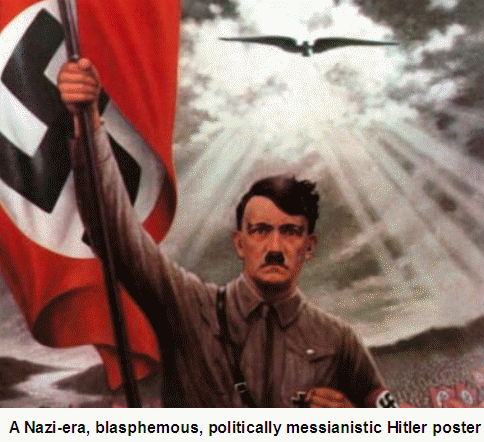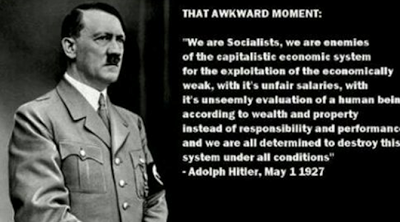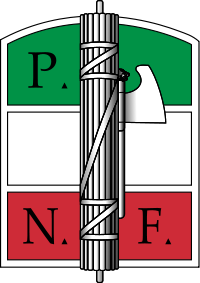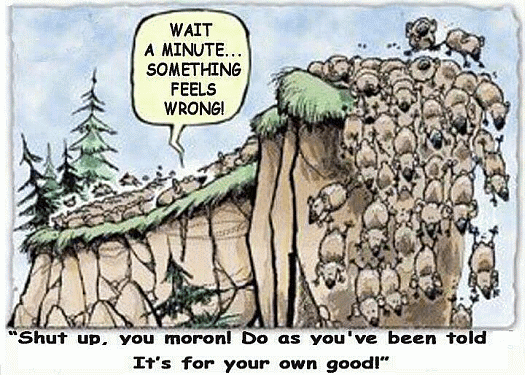One of the ugliest agit prop, street theatre tactics now being commonly used is the accusation: fascist, in effect, outlaw beyond the pale of civil protection. It is therefore appropriate to pause and seek clarification on what fascism really is about.
But first, let us draw attention to a disturbing historical parallel to what we saw on the streets of Berkeley only a few days past; headlining a comment in the still live agit-prop thread:
>>Let’s compare UCB, two Wednesdays ago and another Wednesday in 1921 in Bavaria
http://ww2timelines.com/leader…..2power.htm
>> Wednesday, September 14, 1921
Hitler, a substantial number of members of the Turn-und Sportabteilung, the paramilitary arm of the Nazi Party [ = SA], and other Nazi party adherents disrupted a meeting in Munich at the Lowenbraukeller of the Bavarian League. One Nazi, Hermann Esser, climbed upon a chair and shouted that the Jews were to blame for the misfortunes of Bavaria, and the Nazis shouted demands that Otto Ballerstedt yield the floor to Hitler. The Nazis proceeded to beat up Ballerstedt and shoved him off the stage into the audience. Afterwards both Hitler and Esser were arrested, and Hitler commented notoriously to the police commissioner, “It’s all right. We got what we wanted. Ballerstedt did not speak.” The Bavarian League was federalist organization that objected to the centralism of the Weimar Constitution, but accepted its social program. Ballerstedt, an engineer whom Hitler regarded as “my most dangerous opponent” was its leader.>>
Wiki’s summary:
>>On 14 September 1921, there was a highly publicized incident, when Hitler, Hermann Esser, Oskar Körner (later to die in the Beer Hall Putsch) and some other NSDAP supporters stormed a Ballerstedt meeting in the Munich Löwenbräukeller in order to prevent him giving a lecture. Hitler achieved this goal by drastic measures: He reached Ballerstedt, then assaulted and injured him severely. Ballerstedt was then forcibly dragged out of the Hall. As a result, Hitler was on trial from 27 to 29 January 1922 on charges of a breach of the peace, public indecency and assault. He and Esser were convicted and sentenced to imprisonment for 100 days and payment of 1,000 Reichsmark. The prison sentence was served from 24 June to 27 July 1922 in Munich Stadelheim prison, where Hitler remained only a month.>>
–> Shouting down and silencing speaker through bully-boy tactics, check.
–> Beating up people who dare to differ, check.
–> Overly lenient policing of riots, check.
–> BTW, the speaker disappeared on the night of the long knives and his body was later found with a bullet to the back of the head.
–> Sounds familiar?>>
Let’s roll the tape:
https://www.youtube.com/watch?v=thQ-npCxGMQ
So, we would be well advised to take pause then ask some pointed questions as to who is showing real fascist tendencies through their pattern of actions. I think we would all be well advised to cool down the temperature and get back to recognising that fundamental rights, freedoms and responsibilities should be mutually respected. In the words of the town clerk of Ephesus as reported in Ac 19:
Ac 19:38 If therefore Demetrius and the craftsmen with him have a complaint against anyone, the courts are open, and there are proconsuls. Let them bring charges against one another. 39 But if you seek anything further, it shall be settled in the regular assembly. 40 For we really are in danger of being charged with rioting today, since there is no cause that we can give to justify this commotion.” [ESV]
The clerk then dismissed the riot that — duly manipulated by Demetrius et al — had spent two hours in a blood-curdling fury, mindlessly shouting: “Great is Artemis of the Ephesians!”
With that in the back of our minds, let us now headline another comment in that same thread, to help us clarify the surprisingly vexed question as to just what fascism actually is:
___________________
>>Just what is Fascism/Nazism?
This is a hard Q to give an A to, especially as there is a persistent confusion that it is a “right wing” phenomenon: the extreme form of Capitalism even as Communism is the extreme form of Socialism. Where of course, Fascism and Nazism have become catch-all terms of abuse with enough murkiness that they are just what the agit prop activists want, especially as there is a general feeling that such are beyond the pale of civil discussion.
As in, shutting down discussion in a cloud of hostility, confusion and polarisation to the point where many think of an accused fascist or Nazi as effectively a demonised heretic to be despised and driven out by any means deemed necessary. And of course, serious Bible Believing Christians are then tagged, Christo-fascists or the equivalent.
We therefore need to put up some remarks that will begin to clarify the mess that is now being used to justify violence in the streets and destructive media narratives that use the street agit prop theatre as a platform to sow discord and undermine legitimate, peaceful transfer of power in accord with a lawful election. After all, everybody knows you must not surrender power to Nazis — those right wing thugs being led by the ignorant, stupid, insane and/or wicked.
Resemblance to what is currently going on is NOT coincidental.
No wonder there was a warning that if fascism were to make a comeback, it would do so in the guise of opposing fascism.
In short, the very name “Antifa” is a destructive lie.
(As we can see from its resort to notorious brownshirt tactics and violent suppression of others, even as it projects patently false accusations against those it targets.)
Now, in fact Fascism is a kissing cousin of Marxism-Leninism and Mao-ism, and arose from the rather noxious, tainted stew of trends and themes of the late C 19 as the Judaeo-Christian frame of thought was expelled from the mind-space of far too many intellectuals, artists and political figures. (Don’t forget that that frame of thought had Eugenics as a major movement among the educated and aspirants, and that this was tied to both social darwinism and racism.)
The first clue is the actual name of the Nazi Party: National Socialist German Worker’s/Labour Party.
Regardless of what the proto-fascist philosophers thought and wrote, real world fascism came out of in effect a split of the Socialist movement engendered by the first world war. Mussolini rejected the neutral stance of the socialist international and shifted to Italian Nationalism. His three-fold theme then shaped fascism: Everything in the state, nothing outside the state, nothing against the state — the essence of totalitarianism. Statism was wedded to socialisation of all of life (including an implicit takeover of capital through cartels dominated by the state though nominal ownership remained in private hands), and was tied to nietzschean superman political messianism modelled on a mythical view of the Caesars, and more. This implied one party rule, the police state in some form or other and a militaristic mentality that regimented the ordinary person. And, forget genuine freedom, that was to be shorn of “unnecessary” or “useless” components and the individual was only valuable insofar as he was a stick bound up in the bundle that bore the axe-head. This movement spread across Southern, Eastern and Central Europe and to Latin America, with varying degrees of intensity. (And of course, there were always inconsistencies, Fascism like Marxism is an inherently incoherent ideology held together by force, emotions and agit prop, not any legitimate community consensus based on the state as guardian of the rights of the individual.)
That is why I have put up this summary several times above:
FASCISM: At heart, it is the notion that in a day of “unprecedented” crisis that targets a large — locally dominant or pivotally influential — perceived victim group or class or religious or racial/national body, a super-man figure emerges to rescue the victims; one who is beyond ordinary human powers and limits (including those of morality and just law). A political messiah who stands as champion for the identity group to save it, defending it from the various scapegoated out-groups who are held to be to blame for the victimisation of the in-group. That super-man political messiah then seizes power and is widely recognised as a man of “destiny.” In an atmosphere of hysteria, slander and propagandistic deception that is usually multiplied by chaos and violence or at least riotous assemblies in the streets baying for blood, the power blocs, political, legal, military, corporate, religious, etc then align with him, giving him effectively unlimited power in the face of a crisis. We have now reached the threshold of tyranny. And because of the perceived unprecedented crisis, that super-man “people’s champion” figure is cheered on and supported in taking extraordinary measures; measures that sacrifice liberty and justice for the sake of the promised utopian order. And so reigns of terror and aggressive wars naturally emerge.
And if you think Hitler was not socialistic in his mindset, ponder his remark about the Nazi Flag:
“As National socialists we see our programme in our flag. In red we see the social thoughts of the movement, in white the nationalist thoughts, in the hooked-cross the mission of fighting for the victory of Aryan man and at the same time the victory of the concept of creative work. [NB: The double S in the swastika was seen as not just an abstract racial symbol but as two intertwined S’es: one for Socialism and the other for Seig, victory in German. Creative refers more broadly than to artistic also, and the word for that also begins with S in German. Cf the discussion in an online briefing here.]
The Econ Library discussion is also helpful:
As an economic system, fascism is socialism with a capitalist veneer. The word derives from fasces, the Roman symbol of collectivism and power: a tied bundle of rods with a protruding ax. In its day (the 1920s and 1930s), fascism was seen as the happy medium between boom-and-bust-prone liberal capitalism, with its alleged class conflict, wasteful competition, and profit-oriented egoism, and revolutionary Marxism, with its violent and socially divisive persecution of the bourgeoisie. Fascism substituted the particularity of nationalism and racialism—“blood and soil”—for the internationalism of both classical liberalism and Marxism.
Where socialism sought totalitarian control of a society’s economic processes through direct state operation of the means of production, fascism sought that control indirectly, through domination of nominally private owners. Where socialism nationalized property explicitly, fascism did so implicitly, by requiring owners to use their property in the “national interest”—that is, as the autocratic authority conceived it. (Nevertheless, a few industries were operated by the state.) Where socialism abolished all market relations outright, fascism left the appearance of market relations while planning all economic activities. Where socialism abolished money and prices, fascism controlled the monetary system and set all prices and wages politically. In doing all this, fascism denatured the marketplace. Entrepreneurship was abolished. State ministries, rather than consumers, determined what was produced and under what conditions.
Fascism is to be distinguished from interventionism, or the mixed economy. Interventionism seeks to guide the market process, not eliminate it, as fascism did. Minimum-wage and antitrust laws, though they regulate the free market, are a far cry from multiyear plans from the Ministry of Economics.
Under fascism, the state, through official cartels, controlled all aspects of manufacturing, commerce, finance, and agriculture. Planning boards set product lines, production levels, prices, wages, working conditions, and the size of firms. Licensing was ubiquitous; no economic activity could be undertaken without government permission. Levels of consumption were dictated by the state, and “excess” incomes had to be surrendered as taxes or “loans.” The consequent burdening of manufacturers gave advantages to foreign firms wishing to export. But since government policy aimed at autarky, or national self-sufficiency, protectionism was necessary: imports were barred or strictly controlled, leaving foreign conquest as the only avenue for access to resources unavailable domestically. Fascism was thus incompatible with peace and the international division of labor—hallmarks of [ –> classical as opposed to current] liberalism . . .
Finally, Jonah Goldberg gives us words to ponder that we would do better to listen to and responsibly address rather than indulge in the now all too usual irresponsible rhetoric of mind-closing dismissal:
Angry left-wingers shout that all those to their right, particularly corporate fat cats and the politicians who love them, are fascists. Meanwhile, besieged conser-vatives sit dumbfounded by the nastiness of the slander. Bill Maher to the contrary, fascism is not “when corporations be-come the government.” Ironically, however, George Carlin’s conclu-sion is right, though not his reasoning. If fascism does come to America, it will indeed take the form of “smiley-face fascism”—nice fascism . . . .
The historian R. A. H. Robinson wrote twenty years ago, “Although enormous amounts of research time and mental energy have been put into the study of it . . . fascism has remained the great conundrum for students of the twentieth century.” Meanwhile, the authors of the Dictionnaire historique des fascismes et du nazisme flatly assert, “No universally accepted definition of the fascist phe-nomenon exists, no consensus, however slight, as to its range, its ide-ological origins, or the modalities of action which characterize it.” Stanley G. Payne, considered by many to be the leading living scholar of fascism, wrote in 1995, “At the end of the twentieth cen-tury fascism remains probably the vaguest of the major political terms.” There are even serious scholars who make a credible case that Nazism wasn’t fascist, that fascism doesn’t exist at all, and that it is primarily a secular religion (this is my own view). “[P]ut sim-ply,” writes Gilbert Allardyce, “we have agreed to use the word with-out agreeing on how to define it.”
And yet even though scholars admit that the nature of fascism is vague, complicated, and open to wildly divergent interpretations, many modern liberals and leftists act as if they know exactly what fascism is. What’s more, they see it everywhere—except when they look in the mirror. Indeed, the left wields the term like a cudgel to beat opponents from the public square like seditious pamphleteers. [–> this was written c. 2008 and was likely meant metaphorically]
After all, no one has to take a fascist seriously. You’re under no ob-ligation to listen to a fascist’s arguments or concern yourself with his feelings or rights. It’s why Al Gore and many other environmental-ists are so quick to compare global-warming skeptics to Holocaust deniers. Once such an association takes hold, there’s no reason to give such people the time of day.
In short, “fascist” is a modern word for “heretic,” branding an in-dividual worthy of excommunication from the body politic. The left uses other words—“racist,” “sexist,” “homophobe,” “christianist”— for similar purposes, but these words have less elastic meanings. Fascism, however, is the gift that keeps on giving. George Orwell noted this tendency as early as 1946 in his famous essay “Politics and the English Language”: “The word Fascism has now no mean-ing except in so far as it signifies ‘something not desirable.’ ” . . . .
Particularly in the aftermath of World War I—but beginning much earlier—a fascist moment arose on the ashes of the old European order. It drew together the various strands of European politics and culture—the rise of racist national-ism, the Bismarckian welfare state, and the collapse of Christianity as a source of social and political orthodoxy and universal aspira-tions. In place of Christianity, it offered a new religion of the di-vinized state and the nation as an organic community. This international movement had many variants and offshoots and went by different names in different countries. Its expression in dif-ferent societies varied depending on national culture. This is one of the reasons it is so hard to define [–> BTW, one reason why I focus on the key aspect, political messianism tied to the notion of a charismatic man of destiny above law and whose ideas, words, wishes and personality become a licence to his followers to speak and act without regard to truth, respect for others, fairness and requisites of justice in a world where we are finite, fallible, morally struggling and too often ill-willed] . . . .
Before the war, fascism was widely viewed as a progressive social movement with many liberal and left-wing adherents in Europe and the United States; the horror of the Holocaust completely changed our view of fascism as something uniquely evil and ineluctably bound up with extreme nationalism, paranoia, and genocidal racism. After the war, the American Progressives who had praised Mussolini and even looked sympathetically at Hitler in the 1920s and 1930s had to dis-tance themselves from the horrors of Nazism. Accordingly, leftist in-tellectuals redefined fascism as “right-wing” [–> reflecting Stalin’s propaganda] and projected their own sins onto conservatives, even as they continued to borrow heavily from fascist and pre-fascist thought . . . .
[It was in the 1930’s] that Stalin stumbled on a brilliant tactic of simply labeling all inconvenient ideas and movements fascist. Socialists and progressives aligned with Moscow were called social-ists or progressives, while socialists disloyal or opposed to Moscow were called fascists. Stalin’s theory of social fascism rendered even Franklin Roosevelt a fascist according to loyal Communists every-where. And let us recall that Leon Trotsky was marked for death for allegedly plotting a “fascist coup.” While this tactic was later de-plored by many sane American left-wingers, it is amazing how many useful idiots fell for it at the time, and how long its intellectual half-life has been . . . .
[Also] it must be noted that scholars have had so much difficulty explaining what fascism is because various fascisms have been so different from each other. For example, the Nazis were geno-cidal anti-Semites. The Italian Fascists were protectors of the Jews until the Nazis took over Italy. Fascists fought for the side of the Axis, but the Spanish stayed out of the war (and protected Jews as well) [–> though, a Spanish legion was organised and went to Russia to fight]. The Nazis hated Christianity, the Italians made peace with the Catholic Church (though Mussolini himself despised Christianity with an untrammeled passion), members of the Romanian Legion of the Archangel Michael styled themselves as Christian crusaders. Some fascists championed “state capitalism,” while others, such as the Blue Shirts of Kuomintang China, demanded the immediate seizure of the means of production. The Nazis were officially anti-Bolshevist, but there was a movement of “national Bolshevism” within Nazi ranks, too.
The one thing that unites these movements is that they were all, in their own ways, totalitarian [–> I add, and politically messianistic with a core narrative of rescue for the pivotal identity group]. But what do we mean when we say something is “totalitarian?” The word has certainly taken on an un-derstandably sinister connotation in the last half century. Thanks to work by Hannah Arendt, Zbigniew Brzezinski, and others, it’s be-come a catchall for brutal, soul-killing, Orwellian regimes. But that’s not how the word was originally used or intended. Mussolini himself coined the term to describe a society where everybody belonged, where everyone was taken care of, where everything was inside the state and nothing was outside . . .
Whatever one may choose to think about Goldberg’s book, Liberal Fascism, this summary hits all too close to home. As we look in this ugly mirror, let us all take serious, sobering pause.
Let us therefore stop, re-think and start afresh on sounder foundations of due regard for truth, fairness, accurate conceptions and a due appreciation of the price paid in blood and tears to bring us the lessons of sound history.>>
____________________
It is time for us to reconsider where we are heading as a civilisation, before it is too late:
Part of that is that we need to reconsider how we toss around loaded accusations like “fascist” and “Nazi” or the like. END





